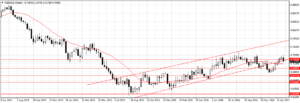- Forex Weekly Outlook February 13-17
The US dollar rebounded mildly last week after President Trump reaffirmed his commitment to tax cuts and fiscal spending.
Although, consumer sentiment drop to 95.7 in January, from 98.5 recorded in December. The economy continued to create jobs, as evidence in the unemployment benefits that fell 12,000 to 234,000. The lowest in three-month.
But because of the uncertainty in the US, investors will be looking for clues in the Fed’s speech due on Wednesday and other economic data like consumer prices, retail sales, industrial production and capacity utilisation that will be released the same day.
In New Zealand, the Reserve Bank of New Zealand (RBNZ) left interest rate unchanged at 1.75 percent. After data showed inflation expectations has been raised from 1.7 percent to 1.9 percent because of an increase in global commodity prices and economic outlook.
However, Governor Graeme Wheeler said the continuous gain in the New Zealand dollar could undermine growth and continues to impact consumer prices. This was the reason the Kiwi dropped against the US dollar last week.
“The exchange rate remains higher than is sustainable for balanced growth and, together with low global inflation, continues to generate negative inflation in the tradable sector. A decline in the exchange rate is needed.” the Governor stated.
Generally, the global financial markets remain vague – especially with the Europe, populist uprising and Greece bailout yet to be settled. Also, it is uncertain to what extent the US president is willing to go with tax cut planned to stimulate growth and immigration reform laws. Nevertheless, Japan Prime Minister Shinzo Abe and President Donald Trump agreed to work together to facilitate trade between the two countries and create jobs.
This week NZDUSD top my list.
NZDUSD
The New Zealand dollar has lost 202 pips since peaking at 0.7374 price levels last week. The bearish engulfed candlestick formed last week, closed below the ascending channel started in September 2015. This further validated the fact that the New Zealand dollar rally has ended. A break of 0.7401 will be needed to invalidate this bearish view.

Click to enlarge
Therefore, in view of current RBNZ stand on the foreign exchange rate and the US continuous positive economic outlook. I will be looking to sell this pair below the ascending channel, 0.7253 resistance levels for 0.6989 target. However, it is nimble to monitor policy makers’ comments in the US, most importantly president Trump as his intermittent comments can invalidate this view.